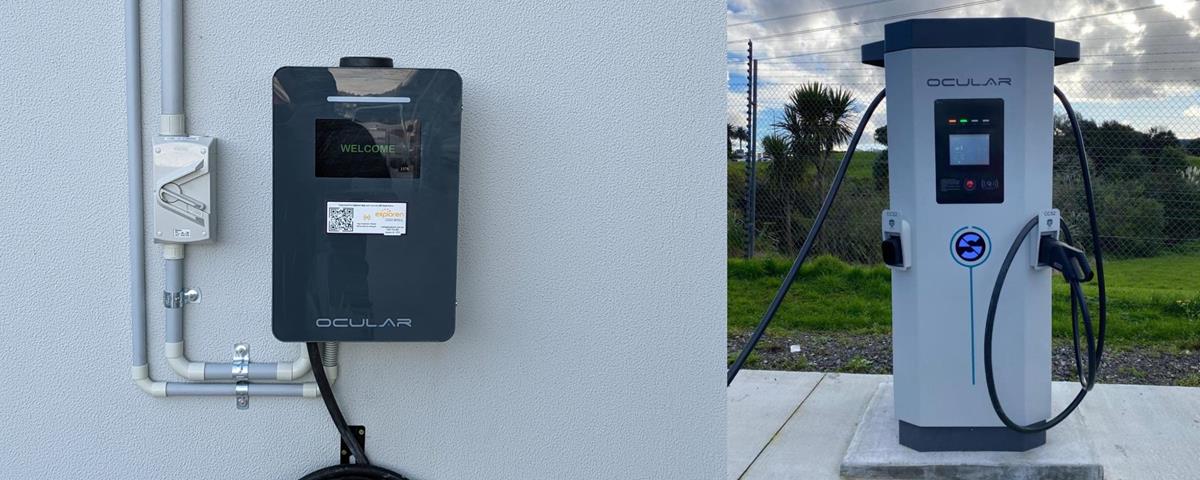Commercial EV Charger – Should I Choose AC or DC charging?

Choosing the appropriate charging infrastructure is one of the most important considerations that businesses and infrastructure planners must consider in the rapidly evolving age of electric vehicles (EVs). The argument over AC (alternating current) vs DC (direct current) charging systems is becoming increasingly significant as the demand for EVs rises. Both provide unique benefits and meet different demands, but choosing between the two requires carefully considering several different aspects.
Knowing the Fundamentals: AC vs DC
AC charging involves converting alternating current from the grid into the direct current required by EV batteries using an onboard charger within the vehicle. Conversely, DC charging disregards this conversion step and applies DC power to the battery directly via specialised chargers, sometimes known as fast chargers.
Speed: Exploring the Need for Rapid Charging
DC charging leads the way in terms of speed. High-power charging can be provided by DC fast chargers, allowing EV owners to restore a sizable amount of their battery capacity in a matter of minutes as opposed to hours. Businesses like shopping centres, restaurants, and entertainment venues that serve patrons with brief dwell times would find this function especially helpful. Businesses may increase the convenience and appeal of their locations while strengthening customer loyalty by providing fast charging choices, helping attract more EV customers.
Before purchasing a DC fast charger, you must evaluate the target audience’s actual charging requirements. Even though fast charging capabilities are obviously useful, not all EV users need ultrafast charging speeds for their regular activities. For example, commuters who can keep their car charging for a longer period of time within their home or place of employment would prefer slower but less expensive charging options.
Cost Considerations: Striking a balance between initial outlay and sustained savings
One important consideration when choosing between AC and DC chargers is the initial expense of installing the necessary infrastructure. DC fast chargers are more expensive to buy initially than AC chargers because they usually need specialised equipment, high-power connections, and extra safety features. Furthermore, the overall cost of ownership should account for continuing operating costs like maintenance and electricity bills.
Although the initial cost of DC chargers may appear high, it is important to take into account the possible long-term savings and income opportunities they can provide. Fast charging services come with a premium pricing model that businesses in high traffic locations can take advantage of to gradually offset their initial expenditure. Furthermore, establishing DC charging infrastructure may be made more affordable by taking advantage of grants, incentives, and rebates provided by utility companies and government organisations. This makes DC charging infrastructure a more attractive alternative for companies looking to future-proof their operations.
Efficiency vs Flexibility: Adjusting to Changing Needs
Efficiency and flexibility must be traded off when deciding between AC and DC chargers. Because they may use the current electrical infrastructure without requiring any adjustments, AC chargers provide more installation possibilities. Due to its adaptability, AC chargers can be integrated with solar PV systems, retrofitted into existing buildings, and used to accommodate a variety of parking configurations.
In contrast, DC fast chargers prioritise speed and economy at the expense of some degree of flexibility. To ensure optimum performance and safety standards, these chargers need specific electrical connections, cooling systems, and site preparations. Businesses in high-demand locations can take advantage of DC chargers’ efficiency to draw in more customers while enhancing the charging experience overall, even though this may restrict the deployment options available to them.
Embracing technological advancements to ensure future-proofing
Its critical to future-proof your charging infrastructure if you want to stay ahead of the curve as the EV market develops. Although DC fast chargers are now capable of offering the quickest charging speeds, continued developments in battery science, charging protocols, and the incorporation of renewable energy sources could eventually affect how competitive AC chargers are. In order to comply with future regulations and technical advancements, companies seeking to engage in EV charging infrastructure must evaluate the scalability, interoperability, and upgradeability of the charging system you have selected.
Additionally, the distinctions between AC and DC charging systems are becoming less clear as new developments like bi-directional charging, vehicle to grid (V2G) integration, and smart grid management change the EV charging environment. Businesses can future-proof their operations and earn new revenue streams from the electrification of transport by implementing flexible and adaptable charging systems that make use of these advancements.
In summary, careful evaluation of an assortment of criteria, including speed, affordability, flexibility, and future-proofing, is necessary when deciding between AC and DC commercial EV chargers. Compared to AC chargers, DC fast chargers are more expensive up front and have fewer deployment choices, despite their greater speed and efficiency. You may customise your charging infrastructure to maximise cost, sustainability, and convenience for your stakeholders and consumers by evaluating your long-term goals, budgetary restrictions, and specific operating demands.
Ultimately, making informed decisions is the first step on the path to a more sustainable and greener future. Accepting innovation, adaptability, and teamwork will be essential in reaching the full potential of electric mobility and bringing about significant change in the transportation sector, regardless of whether you choose AC or DC charging. Businesses that stay flexible, adaptable, and forward-thinking will be the most well-positioned to prosper in the electrified era as the EV charging landscape continues to change.
Have further questions? Contact us:
[email protected]
1300 406 210


